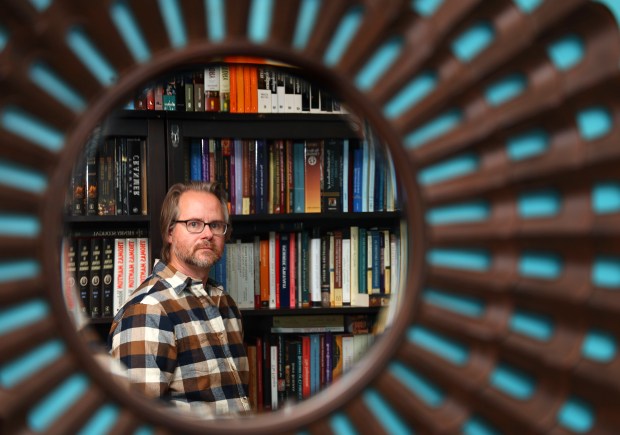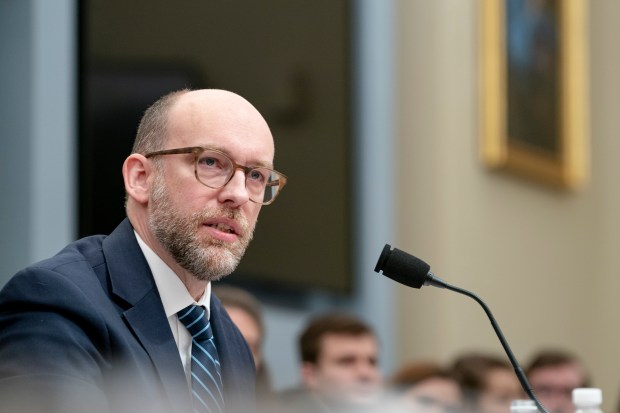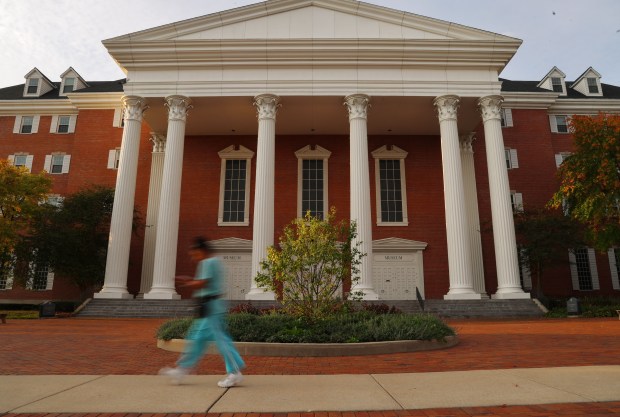As a chief architect of Project 2025, Russell Vought has risen into the national spotlight for co-authoring the controversial conservative blueprint designed to radically overhaul the federal government under the next Republican president.
But years ago, the Wheaton College graduate made headlines for another written work — one that included strong words against Muslims used in defense of the actions of his alma mater.
The west suburban evangelical Christian college in 2015 suspended its first tenured Black female faculty member after she announced plans to wear a hijab in solidarity with Muslims facing persecution, while stating that Christians and Muslims “worship the same God.” Some evangelical leaders criticized her for not explaining what makes Islam distinct from Christianity.
Vought’s rebuke went even further.
“Muslims do not simply have a deficient theology,” he wrote in an article for the website The Resurgent. “They do not know God because they have rejected Jesus Christ his Son, and they stand condemned.”
That assertion would haunt Vought politically during his 2017 nomination by President Donald Trump to serve as deputy White House budget director. Vermont Sen. Bernie Sanders opposed Vought’s confirmation, saying “this nominee is really not someone who is what this country is supposed to be about,” while describing the essay as “indefensible.”
“It is hateful. It is Islamaphobic. And it is an insult to over a billion Muslims throughout the world,” Sanders said during a contentious hearing, though Vought’s confirmation was narrowly saved in a 50-49 vote, with Vice President Mike Pence casting the tiebreaker.
With the high-stakes 2024 presidential election looming, various alumni and former faculty of Wheaton College — a private liberal arts school of under 3,000 students about 30 miles west of downtown Chicago — are playing an outsized role in the pending fate of the nation’s leadership, as evangelical Christianity in America faces a crossroads over a potential Trump second term.
Like Vought, some with ties to Wheaton are vying to shift the nation to a more conservative future. Vought, who serves as policy director of the Republican Party’s platform writing committee and president of the right-leaning Center for Renewing America, did not return Tribune requests for comment.
At the same time, an evangelical Christian movement against Trump and the MAGA contingent has also been championed by notable voices linked to Wheaton, from a prominent political columnist to a faculty statement decrying the Jan. 6, 2021, insurrection to academics who have come out in favor of Democratic presidential nominee Vice President Kamala Harris.
Although roughly 8 in 10 white evangelical Christian voters supported Trump in 2016 and 2020, a growing number of leaders in the faith are also working to stave off a return to power for the Republican nominee. That political divide is in many ways mirrored in the broader world of Wheaton College, which is often dubbed the Harvard of Christian schools.
College officials, however, seem to be trying to stay out of the fray of the heated presidential campaign.
A late August email from the provost to faculty reminded everyone that Wheaton College is a nonpartisan, not-for-profit charitable institution and “we are institutionally and individually prohibited from endorsing any party affiliation over another or particular candidates for public office.”
“As a nonprofit Christian liberal arts institution with nearly 50,000 living alumni, Wheaton College is strictly nonpartisan and does not participate in electoral politics,” Wheaton College spokesman Joseph Moore said in an email to the Tribune. “However, members of our community, as well as our alumni, have the freedom of their political viewpoints and party affiliations. We have countless alumni with views across a political spectrum, as all colleges and universities do.”
Alum David Congdon, an instructor at McCormick Theological Seminary in Chicago, noted that his alma mater “has been, for some time, a symbol of American evangelicalism.”
“It just has a remarkably powerful role in the religious landscape of the country,” said Congdon, author of the book “Who is a True Christian? Contesting Religious Identity in American Culture,” which includes a section on the college. “The challenge facing Wheaton College is that evangelicalism surrounding it has changed in many ways. And that makes it difficult for an institution like Wheaton, which has this long-standing identity … to know how to navigate the rifts within evangelicalism today. And that’s led to, I think, an internal dissonance within the institution.”
Compared to other periods in Wheaton’s history, Congdon believes that lately the school is trying to be less reflective of American evangelicalism.
“Because evangelicalism is sort of in crisis,” he said, referring to the political and cultural turmoil.
The college is instead striving to be “more of a stable representative of what evangelicalism ought to to be,” Congdon added.
The words of Billy Graham
To the group Evangelicals for Harris, casting a ballot in the upcoming election “isn’t just a vote; it is a reflection of our faith,” according to its website.
The political action committee hosted an August Zoom call featuring a panel of about 20 speakers, including pastors and academics. One was a Wheaton College graduate who recently served as associate chaplain of discipleship at the college.
Another Evangelicals for Harris speaker was former Wheaton College visiting assistant professor of history Joey Cochran. He told the Tribune during a recent interview that he was “thrilled” to endorse Harris, in part because he fears the basic tenets of American democracy would be at risk under another Trump administration.
“For all of us who believe in democracy, we believe there should be a peaceful transfer of power every four years in the executive branch,” Cochran said. “Until the last transfer of power, I don’t think we ever thought this wouldn’t happen peacefully.”

Cochran left Wheaton College in the spring. During his four years there, his online essays and social media posts about the fall of Roe v. Wade and the Israel-Hamas war were targeted by various high-profile conservatives, including William Wolfe, a Southern Baptist and close affiliate of Vought who served as a senior official in the Trump administration.
“‘Christian’ faculty who need to be fired post haste,” Wolfe posted on the social media site X while tagging Cochran and two other academics and their colleges on June 24, 2022, the day the U.S. Supreme Court overturned Roe.
Cochran was also one of three Wheaton College faculty members included on the right-leaning youth organization Turning Point USA’s “professor watch list,” which “uncovers the most radical, left-wing professors from universities that are known to suppress conservative voices and advance the progressive agenda,” according to a video on the group’s website by founder Charlie Kirk, a northwest suburban Prospect Heights native.
Now Cochran works as an instructor of history at Purdue University Northwest, a public school in Hammond.
Cochran said he exited Wheaton College after officials informed him last year that his hours were being cut to part time, which the west suburban father of four said was unsustainable for his family; he wonders, though, if the online controversies or politics played a part in the college’s decision.
Wheaton officials said in a statement that Cochran “was not forced out of a position at Wheaton College.”
“He was a one-year visiting assistant-professor sabbatical replacement for a history professor last year,” Moore, the school’s spokesman, said in an email. “He taught as an adjunct for a period of time at Wheaton before that. The college did not have any tenure-track positions open at the conclusion of our most recent academic year, and he took a position at another institution.”
As for Evangelicals for Harris, the group recently invoked the memory of perhaps the most world-renowned Wheaton College alum in a political advertisement that went viral.
It begins with footage of the Rev. Billy Graham, known as “America’s preacher,” calling on the faithful to confess their sins and repent.
“Have you been to the cross and said, ‘Lord, I’ve sinned? I’m sorry for my sin and willing to change my way of life,’” said the evangelist, a 1943 Wheaton College graduate who died in 2018.
That clip is followed by a video of Trump’s response to the question of whether he’s ever asked God for forgiveness.
“That’s a tough question. I’m not sure I have,” Trump replied. “I just, I don’t bring God into that picture. I don’t.”
Billy Graham’s granddaughter, Jerushah Duford, was among the featured speakers who expressed support for Harris during the Evangelicals for Harris Zoom call.
But the political ad was lambasted by Billy Graham’s son, the Rev. Franklin Graham, who had spoken in favor of Trump during the July Republican National Convention in Milwaukee, appearing after pro wrestler Hulk Hogan.
“The liberals are using anything and everything they can to promote candidate Harris. They even developed a political ad trying to use my father Billy Graham’s image to help promote her — or rather to try to make Donald J. Trump look bad. They are trying to mislead people,” he wrote in a Facebook post that received more than 100,000 likes. “Maybe they don’t know that my father was a firm supporter of President Trump in 2016. He appreciated the conservative values and policies of President Trump, and if he were alive today, my father’s views and opinions would not have changed.”
‘Save the country’
Trump has repeatedly tried to distance himself from Project 2025, the roughly 900-page presidential transitional document that calls for the elimination of the U.S. Department of Education, the dismantling of the Department of Homeland Security and an end to diversity, inclusion and equity initiatives, among other sweeping changes.
“I have nothing to do with Project 2025,” Trump said during his presidential debate against Harris this month. “That’s out there. I haven’t read it. I don’t want to read it, purposely. I’m not going to read it.”
Democratic leaders enlarged a copy of the book, “Mandate for Leadership: The Conservative Promise,” which outlines Project 2025, and they used it as an anti-Republican prop during the Democratic National Convention in Chicago.
Harris has frequently denounced the manual, noting Trump’s political connections to many of its authors.
“What you’re going to hear tonight is a detailed and dangerous plan called Project 2025 that the former president intends on implementing if he were elected again,” Harris said during the debate.
And Vought, who went on to lead the Office of Management and Budget under Trump, was caught on a secretly recorded video last month countering Trump’s disavowal of Project 2025. Vought claimed that behind the scenes, Trump has actually “blessed” the work of the Center for Renewing America, a major force behind Project 2025

“He’s very supportive of what we do,” Vought said on the video, which was taken by undercover British journalists from the Centre for Climate Reporting posing as potential donors, a tactic generally rejected as unethical by mainstream American media outlets.
Project 2025 was also spearheaded by the Heritage Foundation, a conservative think tank where another Wheaton College alum, Eric Teetsel, served as vice president of government relations until mid-September.
Teetsel described Project 2025 as “the conservative movement’s attempt to put our ideas on the table and say, ‘this is what we think will make this a better place to live,’” during a recent interview with the Tribune.
He added that more than 100 conservative organizations worked on the document.
A number of others listed as “Mandate for Leadership” authors and contributors have various local connections. One is former Trump economic adviser Stephen Moore, who graduated from New Trier High School in Winnetka. Another is John Ratcliffe, who was director of national intelligence under Trump and was born in Mount Prospect. Kiron Skinner, a former Trump administration official who authored a chapter on the Department of State, is from Chicago. The document’s afterward was written by Heritage Foundation founder and former president Edwin John Feulner Jr., who was born in Chicago.
Although Teetsel said he “grew as a person of faith” while attending Wheaton College, he stressed that he traces none of his political convictions or ideologies to his time there. The 2006 alum railed against what he described as “the left-leaning political orientation” on campus, which he believes has only proliferated since his graduation.
“People go in expecting that it’s a conservative Christian school. Certainly the parents who send their kids there and the donors expect that, when in fact that is not what students experience on campus,” he said. “Wheaton has repeatedly demonstrated, and I think it’s fair to say chosen, the path of least resistance when it comes to the big issues in our culture today. … And what that has done is facilitate the presence of pernicious, damaging, unbiblical, ungodly ideologies on campus.”
Teetsal was a vocal critic of the 2014 hiring of Julie Rodgers, Wheaton College’s first staff member charged with serving the gay and lesbian community in the chaplain’s office.
At the time, Rodgers was openly lesbian but declared herself celibate after years of enduring so-called conversion therapy, which was embraced by some conservative churches in an attempt to turn gay people straight. In the 2021 Netflix documentary “Pray Away,” she chronicled the harms of the practice and urged its end.
Rodgers resigned from her Wheaton College job in 2015, writing on her blog that she had “quietly supported same-sex relationships for a while now.”
“I’ve become increasingly troubled by the unintended consequences of messages that insist all LGBT people commit to lifelong celibacy,” wrote Rodgers, who did not return Tribune requests for comment. “No matter how graciously it’s framed, that message tends to contribute to feelings of shame and alienation for gay Christians.”
Teetsel argued that while Rodgers’ intentions were good, “she is confused and leading others away from the truth,” he said in a 2015 blog post.
“Every institution of Christian higher education must take seriously the prevalence of all sorts of sexual confusion and sin on campus, but particularly homosexuality, a burden whose weight has proven too much to bear for far too many of our beloved brothers and sisters,” the blog post said.
His essay concluded that “hiring Rodgers and giving her access to students as a voice of wisdom and authority was an error for which Wheaton owes students, parents and the entire alumni community an apology.”
Looking forward to the November election, Teetsel referred to the group Evangelicals for Harris as “fake AstroTurf,” and predicted that about 80% of evangelical voters would support the Republican nominee.
“Whatever concerns they may have about Donald Trump pale in comparison to what they know about where Kamala Harris stands on issues about which the Bible is absolutely clear, like the issue of life, the issue of human sexuality and so on,” he said.
A Pew Research Center survey released this month found 82% of white evangelical Protestants would vote for Trump or are leaning toward doing so; the Republican nominee also appealed to 61% of white Catholics and 58% of White non-evangelical Protestants.
However, many respondents of other faiths and backgrounds — 86% of Black Protestants, 85% of atheists, 65% of Hispanic Catholics and 65% of Jewish voters — reported that they would vote for Harris or were leaning toward doing so, according to the poll.
On Sept. 3, Vought announced on social media that Teetsel would be joining the Center for Renewing America as executive vice president.
“Eric is going to be indispensable … as we expand our efforts to save the country!” Vought posted on X.
“Let’s roll,” Teetsel responded.
Mounting opposition
A diverse group of dozens of evangelical leaders from all over the country — as well as some from other parts of the world — held a private meeting at Wheaton College in spring 2018, spurred by their rising concerns about the influence of Trump and partisan politics on their faith.
The two-day gathering was held at the Billy Graham Center. One organizer was Wheaton College alum Douglas Birdsall, honorary chair of the Lausanne Movement, an international Christian organization.
Wheaton College graduate and longtime faculty member Mark Noll, who was asked to speak at the event about the history of American politics and Christianity, recalled that many participants were frustrated by the political alliance between white evangelical communities and the Republican Party.
“There was a lot of anti-Trump rhetoric at that meeting, which was certainly interesting to listen to,” Noll said. “But there wasn’t agreement on what the practical steps could be to mobilize, to organize.”
Some attendees specifically complained about Trump; others were more worried that politics were being prioritized over theology, he recounted.
“I just don’t think it’s at all good for Christian people to tie their Christian faith, without reservation, to any political system,” said Noll, who taught at Wheaton College for nearly 30 years. “If your Christian identity is equated with a political position that, to me, is a very damaging matter.”
In the years that followed, opposition to Trump emanating from Wheaton College and its graduates grew stronger.
Nationally syndicated Washington Post columnist Michael Gerson, once a presidential speechwriter for George W. Bush, repeatedly excoriated evangelical support of Trump.
“In the process, evangelical leaders have placed themselves — uncritically, with open eyes — into a political coalition that is inspired by ethnic nationalism,” Gerson, a Wheaton College graduate, wrote in a 2019 column a few years before his death in 2022. “Such are the occupational hazards of calling good evil, and evil good.”
The outcry hit a fever pitch after the Jan. 6, 2021, insurrection on the U.S. Capitol by a pro-Trump mob.
“It’s time for an evangelical reckoning,” Ed Stetzer, then a Wheaton College dean and leader of the school’s Billy Graham Center, wrote in an opinion piece that ran in USA Today.
The op-ed also mourned “the trail of destruction (Trump) has left within the evangelical movement.”
Shortly after the Jan. 6 attack, more than 200 Wheaton College faculty and staff signed a statement contending that “more leaders, including many evangelical leaders, could have spoken truth to the disillusioned supporters of President Trump — diminishing the prospects for violence and bolstering the witness of Christian love and the call for justice in our civic life.”
“The January 6 attack on the Capitol was characterized not only by vicious lies, deplorable violence, white supremacy, white nationalism, and wicked leadership — especially by President Trump — but also by idolatrous and blasphemous abuses of Christian symbols,” the statement said.
Alum Michael Nietzel called it a bold message to emerge from the faculty and staff of a flagship evangelical college.
“Wheaton still enjoys a sterling reputation among Christian colleges, so it was meaningful for Wheaton faculty to make that statement,” said Nietzel, who served as president of Missouri State University from 2005 to 2010. “It made people take notice that there was a growing voice in the evangelical church that wasn’t swallowing this Christian nationalism and this perversion of the Gospel that you’d see with so many people that buy into the whole Trump ideology.”
While Nietzel hopes more evangelicals will oppose Trump in November, he’s not overly optimistic.
“It looks to me, among the far-right Christian church, there’s still strong support for Trump,” he said.
A Lifeway Research study of American Protestant pastors released Tuesday found 97% plan to vote in the presidential election but 23% refused to say who they planned to vote for, compared with 4% in 2020 and 3% in 2016, according to the survey.
Of those pastors who plan to vote and disclosed their preference, half said they would vote for Trump, while a little less than a quarter favored Harris; 23% were undecided, the poll showed.
Central matters
On a recent weeknight, the 500-seat auditorium in Billy Graham Hall at Wheaton College was nearly full for a discussion on evangelicalism and politics titled “Our Hope, Your Vote, and What Really Matters.”
The gathering began with a prayer.
So we submit our conversation to you tonight and we trust you Lord to guide and direct it, and we ask that you would make our path straight. Lord, we do pray for our nation during this election season. We ask Lord for your blessing and for your guidance.
The first speaker was Curtis Chang, consulting professor at Duke Divinity School and senior fellow at Fuller Theological Seminary.
He began by noting that, in the evangelical world, Wheaton College “represents a centrist institution,” not in a political sense but in the truest meaning of the term.
“It has centered itself … on the central matters that matter most,” said Chang, who was raised in north suburban Morton Grove and Skokie. “Center derives from the Latin crux. … And crux of course derives from the cross. And that’s Wheaton at its best. It has planted itself on saying we will stand for what is central to our faith.”
As a centrist institution, Wheaton College can be a gathering place and meeting point for people who hold other views on matters that are non-central — including politics — even if those people don’t always agree, added Chang, co-author of the book “The After Party: Toward Better Christian Politics.”
“Believe me, our world and our church, we need the center to hold,” he said.
The other speaker was Tim Alberta, staff writer at The Atlantic and author of The New York Times best-seller “The Kingdom, The Power, and The Glory: American Evangelicals in an Age of Extremism.”
Alberta lamented that “so many of us believe we are locked in this trench warfare mentality of ‘this election could be the last.’”
Just that week, he said, he received two fundraising appeals from large evangelical organizations warning that this election could mark the end of Christian America, depending on the outcome.
“And it’s easy in that ecosystem to do away with the Sermon on the Mount, to dispose of the Beatitudes and to pick the sword back up and believe that, ultimately, the ends justify the means,” he said, pointing out the disconnect in this mentality.
Toward the end, the speakers fielded weighty questions from the audience that intertwined morality, theology and politics.
How can a Christian support Democrats who favor reproductive rights? What would you tell children concerned about the extremism of their parents, or anyone who is in relationships that are fracturing around the polarization of this era? What is it about Donald Trump that you think is so appealing to so many Christians?
At one point, Alberta recalled how his late father, an evangelical pastor, always had two sayings around election time. The first was, “God does not bite his fingernails.”
“Like, it’s going to be OK. — He will still be sovereign the day after the election,” Alberta said, eliciting laughs from the audience.
His dad’s other election season mantra was, “Folks, as Christians we are in sales, not management.”
The crowd laughed again.
“It is not your job to worry about the world around you,” Alberta said. “It is not your job to fret and to panic about these perceived threats.”
Nor is it anyone’s job to put together a coalition to save Christian America, out of a need to win by any means, he added.
“Your job, and the way in which you will one day receive that welcome of ‘Well done, good and faithful servant,’ is by selling the gospel of Jesus Christ,” Alberta said. “And by doing it in the unlikeliest of places to the unlikeliest of people.”
eleventis@chicagotribune.com




